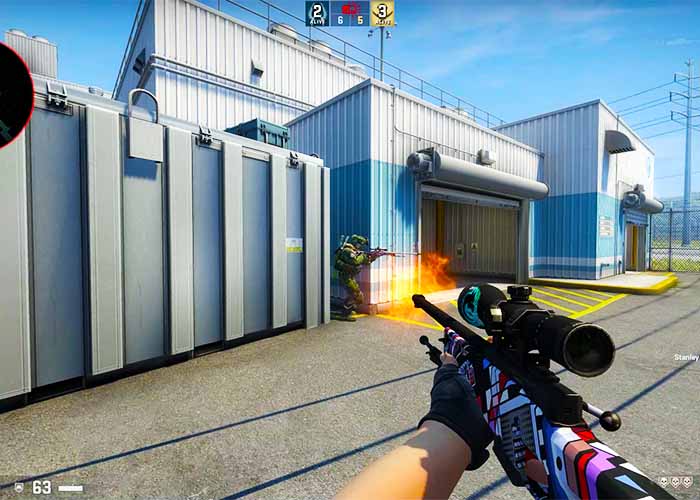To fully comprehend the proliferation of CS:GO sites, it's imperative to understand the genesis and significance of skins in the game. Skins were introduced in August 2013 with the "Arms Deal" update, revolutionizing the way players interacted with CS:GO. These cosmetic items range from common designs to exceedingly rare and visually stunning patterns, some of which are coveted by collectors and professional players alike.
Rarity and Value: Skins are categorized by rarity levels, from Consumer Grade (common) to Covert (very rare), and further distinguished by wear levels, such as Factory New or Battle-Scarred. The rarity and condition directly influence the skin's market value.
Community Engagement: Skins have fostered a deeper level of engagement within the community, encouraging players to personalize their gaming experience and participate in the broader economy.
Trading and Economy: The ability to trade skins has transformed them into virtual commodities, with some high-end skins being sold for thousands of dollars. This virtual economy has extended beyond the official Steam Marketplace, giving rise to numerous third-party CS:GO sites.
An Overview of CS:GO Sites
CS:GO sites encompass a variety of platforms, each serving different purposes within the skin economy. They can be broadly classified into several categories:
1. Skin Trading Platforms and Marketplaces
These sites facilitate the buying, selling, and trading of skins outside the Steam Marketplace.
Advantages over Steam Marketplace:
- Lower Fees: Steam charges a transaction fee, whereas third-party sites often have lower or no fees.
- Real Money Transactions: Steam Wallet funds cannot be withdrawn as cash, but third-party sites allow users to cash out earnings.
- Enhanced Features: Advanced search options, price negotiation tools, and bulk trading capabilities.
Security Measures: Reputable sites implement security protocols, such as two-factor authentication and escrow services, to protect users from scams.
Risks: Users must be cautious of fraudulent sites or phishing attempts that aim to steal login credentials or skins.
2. Case Opening Websites
Emulating the excitement of in-game case openings, these sites offer a gamified experience.
Operation Mechanics:
- Users purchase virtual keys or credits to open cases.
- Each case contains a random skin, with probabilities assigned to different items.
- The allure lies in the potential to obtain rare and valuable skins for a relatively low cost.
Provably Fair Systems:
- To ensure fairness, many sites employ cryptographic algorithms that allow users to verify the randomness of the results.
- This transparency is crucial for building trust with users.
Controversies:
- Some sites have faced allegations of manipulating odds or not disclosing accurate probabilities.
- Ethical concerns arise when users, particularly minors, engage in what is effectively gambling.
3. Gambling and Betting Sites
These platforms offer casino-like games where users can wager skins or virtual currency.
Types of Games:
- Roulette: Users bet on colors or numbers, similar to traditional roulette.
- Coin Flip: A head-to-head game where players bet skins in a winner-takes-all format.
- Crash: Users place bets and watch a multiplier increase until it "crashes"; the goal is to cash out before it does.
- Jackpot: Players contribute skins to a pot, and the winner is selected randomly, with odds proportional to their contribution.
Legal and Ethical Issues:
- Gambling Laws: Many jurisdictions have strict laws regulating gambling, and these sites often operate without proper licenses.
- Underage Access: The ease of access has led to concerns about minors participating in gambling activities.
- Addiction Risks: The addictive nature of gambling can lead to significant financial and psychological harm.
Regulatory Actions:
- In response to public outcry, regulatory bodies and Valve have taken steps to shut down or restrict these sites.
- Notable lawsuits have been filed against platforms and influencers promoting such sites without disclosing affiliations.
4. Esports Betting Platforms
Focusing on the competitive scene, these sites allow users to bet on the outcomes of professional CS:GO matches.
Betting Options:
- Match Winner: Betting on which team will win a match.
- Handicap Bets: Wagering with a virtual advantage or disadvantage applied to a team.
- Prop Bets: Betting on specific occurrences within a match, such as the number of rounds won.
Impact on Esports:
- Increased Engagement: Betting can enhance viewer interest and investment in matches.
- Integrity Concerns: The potential for match-fixing and betting scandals poses a threat to the integrity of the sport.
Regulatory Compliance:
- Legitimate sites are required to obtain gambling licenses and adhere to regulations regarding age verification and responsible gambling practices.
5. Upgrade and Crafting Sites
Offering an alternative to traditional trading, these sites allow users to risk their skins for a chance to obtain higher-tier items.
Mechanics:
- Users select a skin to upgrade and choose a target item of higher value.
- The success probability is calculated based on the value difference.
- A random number generator determines the outcome.
User Experience:
- Provides a sense of control over the upgrading process.
- Appeals to users looking to enhance their inventory without direct purchase.
Risks and Fairness:
- As with gambling sites, the fairness of the outcome relies on the platform's integrity.
- Users risk losing their original skins with each attempt.
The Legal Landscape and Valve's Stance
The proliferation of CS:GO sites has attracted legal scrutiny and prompted responses from Valve, the game's developer.
Valve's Terms of Service:
- Valve prohibits the use of Steam accounts for commercial purposes not authorized by the company.
- The use of the Steam API for gambling activities is explicitly disallowed.
Cease-and-Desist Actions:
- In 2016, Valve issued cease-and-desist letters to over 20 gambling sites, instructing them to cease operations involving Steam's API.
- This move was in response to lawsuits and increasing regulatory pressure.
Impact on Sites:
- Some sites shut down or shifted their focus to other games or virtual items.
- Others attempted to circumvent restrictions, leading to ongoing cat-and-mouse dynamics.
Regulatory Responses:
- United States: Legal actions have been taken against sites and individuals promoting underage gambling.
- United Kingdom: The Gambling Commission has investigated and prosecuted operators of illegal gambling sites involving skins.
- Australia and Other Countries: Similar regulatory efforts are underway to address unlicensed gambling activities.
Ethical Considerations and Community Impact
The emergence of CS:GO sites has had profound effects on the gaming community, raising ethical questions and affecting player experiences.
Underage Gambling:
- The accessibility of these sites to minors has been a significant concern.
- Age verification processes are often inadequate, exposing young players to gambling.
Influencer Responsibility:
- Streamers and content creators have faced criticism for promoting gambling sites, sometimes without disclosing financial ties.
- This raises ethical issues regarding transparency and the influence on impressionable audiences.
Addiction and Financial Harm:
- The addictive nature of gambling can lead to significant personal and financial consequences.
- Stories have emerged of individuals losing substantial amounts of money or skins, impacting their well-being.
Community Division:
- The association of CS:GO with gambling has led to divisions within the community.
- Some players advocate for stricter controls, while others defend the freedom to engage in these activities.
Best Practices for Users
For those choosing to engage with CS:GO sites, adopting best practices can mitigate risks.
Research and Verification:
- Use reputable sites with positive reviews and transparent operations.
- Verify the site's legitimacy through community forums and trusted sources.
Security Measures:
- Enable two-factor authentication on Steam and the CS:GO site.
- Be cautious of phishing attempts and never share login credentials.
Legal Compliance:
- Understand the legal implications in your jurisdiction regarding online gambling and virtual item transactions.
- Ensure compliance with age restrictions and other regulatory requirements.
Responsible Engagement:
- Set limits on spending and time invested in these platforms.
- Recognize signs of addictive behavior and seek help if necessary.
The Evolving Landscape and Future Outlook
The future of CS:GO sites is shaped by technological advancements, regulatory developments, and shifts in community attitudes.
Technological Innovations:
- The integration of blockchain technology could enhance transparency and security.
- Virtual reality and augmented reality may introduce new dimensions to virtual item interactions.
Regulatory Developments:
- Increased regulation may lead to the standardization of operations, ensuring safer user experiences.
- Collaboration between game developers and regulators could establish clearer guidelines.
Community Engagement:
- Ongoing dialogue within the community can foster responsible practices.
- Initiatives promoting awareness of risks and ethical considerations are vital.
Diversification and Expansion:
- CS:GO sites may expand services to include other games and digital assets.
- The rise of non-fungible tokens (NFTs) presents new opportunities and challenges. ## Final Thoughts
As the intersection between gaming and real-world economics continues to deepen, the experiences with CS:GO sites offer valuable lessons. They highlight the need for proactive engagement with emerging trends, thoughtful regulation that protects users without stifling innovation, and a commitment to ethical standards. Whether you are a seasoned player, a newcomer, or an observer, understanding the intricacies of CS:GO sites enriches your perspective on the evolving landscape of digital entertainment.
Things that improve mental focus
- Regular exercise
- Meditation
- Healthy diet
- Good sleep habits




